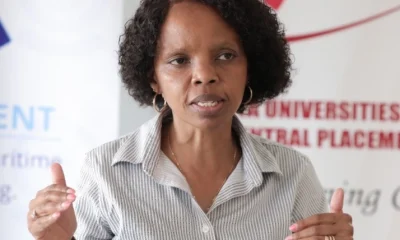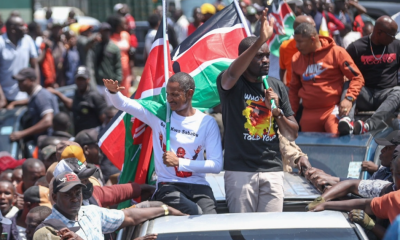Business
MultiChoice Reduces DStv, GOtv Decoder Prices by 30% Following Sharp Decline in Kenyan Subscribers
In a dramatic bid to stem a catastrophic loss of subscribers, MultiChoice has announced price reductions of up to 30% on DStv and GOtv decoders and installation kits in Kenya, effective November 1, 2025. The move comes as the pay-TV giant grapples with one of the most severe subscriber collapses in its operating history.

ALSO READ: A New Chapter: The Viral Meru Lady’s Stunning Makeover Will Leave You Smiling
The price cuts represent a significant shift in strategy for the South African broadcasting company, which has watched its Kenyan customer base evaporate over the past year. Active DStv subscriptions plummeted from 1.19 million to just 188,824 by June 2025—a staggering 84% decline. The situation for GOtv is equally dire, with subscriptions crashing from 2.8 million to 314,000, an 89% drop that has sent shockwaves through the company’s East African operations.
Industry analysts point to a perfect storm of factors behind the exodus: relentless subscription fee increases, Kenya’s persistent economic challenges, and the explosive growth of streaming platforms offering more flexible, affordable alternatives. The COVID-19 pandemic accelerated the shift to digital streaming services, and many Kenyan households have never looked back.
Hardware Discounts Miss the Mark?
Despite the aggressive hardware price reductions, the response from Kenyan consumers has been lukewarm at best, with many questioning whether MultiChoice has misdiagnosed the problem entirely. Social media platforms, particularly X (formerly Twitter), have erupted with criticism suggesting that the real barrier isn’t the one-time cost of equipment but the recurring burden of monthly subscriptions.
“They’re giving us cheaper decoders to trap us into expensive subscriptions,” wrote one Nairobi-based user. “It’s like offering a discount on a cage.”
The sentiment echoes across countless posts, with Kenyans pointing out that a 30% discount on a decoder that costs between KSh 2,500 and KSh 15,000 pales in comparison to monthly subscription fees that can exceed KSh 9,000 for premium DStv packages. For a population struggling with rising living costs, inflation, and stagnant wages, the mathematics simply don’t add up.
The Piracy Elephant in the Room
Perhaps most troubling for MultiChoice are the frank admissions flooding social media about alternative content sources. Kenyan users on X have been remarkably candid, with many openly stating they’ve discovered “other sources” that provide the same channels and content—for free.
“Why would I pay thousands every month when I can watch everything online?” one user posted, a sentiment that garnered thousands of likes and shares. The comment threads reveal a sophisticated network of streaming options, both legal and otherwise, that have rendered traditional pay-TV increasingly obsolete for tech-savvy Kenyans.
The rise of affordable smartphones, improved internet infrastructure, and the proliferation of VPN services have made unauthorized streaming accessible to millions. Meanwhile, legitimate platforms like Netflix, Showmax (ironically, owned by MultiChoice), Amazon Prime Video, and Disney+ offer on-demand content at a fraction of DStv’s premium packages, with no long-term commitment required.
A Market in Transformation
MultiChoice’s predicament in Kenya reflects a broader transformation in how Africans consume entertainment. The company, which once dominated the continent’s pay-TV landscape with little competition, now finds itself fighting for relevance in an era where content is abundant, mobile, and often free.
The decoder price cuts may attract some new customers, particularly in rural areas where streaming remains impractical due to limited internet connectivity. However, the overwhelming sentiment from urban Kenyans—who comprise the bulk of the lost subscribers—suggests that MultiChoice’s problems run far deeper than equipment costs.
“Until they address the actual cost of subscriptions and offer flexible, affordable packages that match what streaming services provide, they’re just rearranging deck chairs on the Titanic,” commented media analyst Patricia Omondi.
As MultiChoice enters the final months of 2025, the company faces a critical crossroads. The decoder discounts may be too little, too late—a superficial remedy for a business model that many Kenyans believe has simply been overtaken by the digital revolution. Whether the broadcasting giant can reinvent itself for the streaming age, or whether it will continue its downward trajectory, remains one of the most closely watched stories in Kenya’s media landscape.
For now, the message from Kenyan consumers is clear: the problem isn’t the price of the box; it’s what they’re being asked to pay every month to use it
Follow us on FACEBOOK
-

 Gossip6 days ago
Gossip6 days agoForeign Tourist’s Viral Uganda Video Ignites Social Media Frenzy Over “Intense Cultural Exchange”
-

 Gossip1 week ago
Gossip1 week agoWoman Unalives Herself On Facebook Live As Viewers Begged Her To Stop
-

 Gossip7 days ago
Gossip7 days agoFake Model Casting Agency Under Fire After Disturbing Video Goes Viral
-

 Nairobi1 week ago
Nairobi1 week agoUS Embassy in Nairobi Closed Monday for President’s Day Federal Holiday
-

 Education7 days ago
Education7 days agoKUCCPS Releases Subject Requirements for All Degree Clusters: What Students Must Know Before Applying
-

 Forecast1 week ago
Forecast1 week agoWill It Rain This Week? Heavy Downpours Expected in Central Kenya, Rift Valley and Coastal Regions
-

 News1 week ago
News1 week ago‘My Position is Safe’: DP Kindiki Shuts Down Political Speculation
-

 Gossip4 days ago
Gossip4 days agoRussian Man’ Unmasked: Govt Officially Names Vladislav Luilkov in Non-Consensual Recording Scandal


















